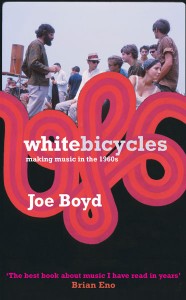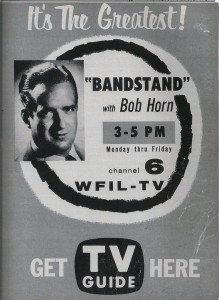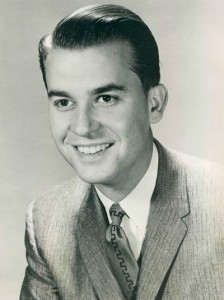He may not be hip, but he was clean
 Two very, very different rock & roll figures died within a day of each other this past week, and have each received, in their own way, extensive media & internet coverage.
Two very, very different rock & roll figures died within a day of each other this past week, and have each received, in their own way, extensive media & internet coverage.
Below is one take on Dick Clark.
One of the news stories I read about Clark noted that he had taken over a local Philadelphia music and dance TV show, “Bandstand” after the original host had been fired.
In the opening chapter of his excellent memoir, White Bicycles: making music in the 1960’s, Joe Boyd describes just what happened. (see bottom of this post for more information about Boyd)
 In 1954, Joe and his brother discovered the TV show “Bob Horn’s WFIL-TV Bandstand, broadcast from Philadelphia every day after school. It was one of the first shows to feature teens dancing in studio to music, both live and lip-synced, and Horn was one of the early DJ’s who discovered the appetite white teenagers had for early rock & roll, including R&B artists. It was daring for those days, and Boyd recounts the fascination he and his classmates had not only for the funk of some of the groups, but for the duck-tailed and rough-looking teens.
In 1954, Joe and his brother discovered the TV show “Bob Horn’s WFIL-TV Bandstand, broadcast from Philadelphia every day after school. It was one of the first shows to feature teens dancing in studio to music, both live and lip-synced, and Horn was one of the early DJ’s who discovered the appetite white teenagers had for early rock & roll, including R&B artists. It was daring for those days, and Boyd recounts the fascination he and his classmates had not only for the funk of some of the groups, but for the duck-tailed and rough-looking teens.
The interviews were musicians were done by a small, regular group of girls, “always blonde and built”, and
completely at home interviewing dangerous-looking pompadoured black men in sharkskin suits. It was not lost on us that these were probably the only occasions on American TV in 1955 when white girls and black men could be seen in such close physical proximity.
One day in 1956, Horn was gone from the show. Horn had been arrested on DUI charges, and a few months later, also indicted on charges of statutory rape, and contributing to the delinquency of a minor.

The station (owned by Walter Annenberg, who also owned the Philadelphia Inquirer, TV Guide, Seventeen magazine and much else, and became a close friend of Richard Nixon) decided to cut the show. The producer pleaded for its life, and Boyd wrote, was given “until noon the next day to find the most clean-cut, above-suspicion, white-bread, all-American disc jockey in God’s creation”. After interviewing a long series of “seedy, unshaven” DJ’s, the producer discovered — at two in the morning — none other than Dick Clark.
For Americans, the denouement of this story lies at the heart of our popular culture. Clark, his white shirt collar outside his blazer, his smile as bright as a toothpaste commercial started work the next day. Within six months, the network was pumping the show into every market in America…
Boyd later found an account of the story by Stanley Blitz, a friend of Horn’s who claimed the whole thing, including the charges was a setup. Annenberg’s wife hated the music, and the deeply religious station manger was offended by Horn’s hipster ways. But nothing — including the fact that Horn was acquitted on the morals charges — saved him, and he later moved to Houston.
Boyd wraps up the chapter,
My brother and I were appalled by Dick Clark from his first day on air. Before long, prefab rockers like Fabian and Frankie Avalon started edging out the doo-wop groups. In a year or two the rock’n’roll era was over, replaced by chirpy corporate pop. Like most non-conforming kids, we began to look further afield for our musical adventures.
And indeed, the rest of the book describes the beginning of those adventures.
More about Bob Horn and Joe Boyd
There is more about Bob Horn here, including allegations (from Horn’s son) of payoff requests “to make the girl leave town”
Joe Boyd is a record producer and writer living in England, but was American born (growing up in New Jersey). A few of his musical experiences: stage manager at the Newport Folk Festival when Dylan went electric, bringing Muddy Waters to the UK for the first time; producing (among many others) Eric Clapton, Pink Floyd, Nick Drake, Fairport Convention, Maria Muldaur, Cubanismo, and on, and has a wide range of work in rock, folk and world music. He’s producing this year’s Luminato presentation, “Music: Love Over and Over – The Songs of Kate McGarrigle“, and will also be speaking on June 13, also as part of the Festival.